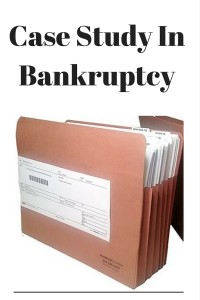This is the bankruptcy case study for Lisa L., who resides on the south side of Chicago. She has come to visit the Southside office at 10540 South Western Ave. to learn more about her rights and possibilities of debt relief under the United States Bankruptcy Code. She met with one of my very competent associate attorneys who covered that office for attorney Cooper. These are the facts of the case. The debtor is not a homeowner. She is currently living with her boyfriend and there is no formal lease. She has a 2011 Hyundai Sonata, financed by Harris Bank and she is continuing to pay $330 per month on that debt. She would like to keep that vehicle through the bankruptcy process which is known as reaffirmation. She owes approximately $8000 on the vehicle and the market value is somewhat less than that. Thus, she will have no difficulty reaffirming the debt as the trustee will not look to administer that asset.
In terms of her personal property and assets, she has a checking account at Chase Bank with an approximate balance of $300. She has normal household items such as a TV and some minor furniture which she values at $500. She has typical clothing which she values at $500. She does have a retirement account, a 401(k), which is 100% protected in a chapter 7 bankruptcy. She values the 401(k) at $20,800. She lists a possible tax refund of $3500. Since we are not in the tax season, the trustees are not inquiring as to refunds at this time. If the debtor decides to file much closer to tax season, then the $3500 refund may become an asset that we have to discuss. She also has two cats which she values at $100. She is currently single with no dependent children. Let’s look at her income next. 
She is currently working as a director and has been working in that capacity for the past six years in Skokie. She is earning approximately 50,000 per year gross which equates to approximately $3100 per month net. When we look at her expenses, her income is certainly offset. For example, she is contributing towards the rental expense, as well as the electricity, gas, cell phone, cable television, food, clothing, laundry, medical, transportation, recreation, auto insurance, auto payment, as well as student loan debt. When we total up her income and subtract her total debt, she does not have available funds from which to fund a chapter 13 repayment plan. Thus, I would recommend a chapter 7 fresh start from what I see so far.
In terms of her statement of financial affairs, she has earned anywhere from 44,000 to 50,000 per year over the past three years. She has not closed a bank account in the last two years, she has not transferred any real estate in the last four years and she has not owned a business within the last four years. There are no lawsuits currently pending, no garnishments or other court actions at the moment. She has had two addresses within the past three years other than her current address. She lived for three years in Chicago and before that for four years in Round Lake. She has no co-signers on her debt. She has no tax debt. She does however have a student loan debt in which she owes approximately $30,000. This debt is going to survive a chapter 7 bankruptcy and it will remain due and owing after the case is completed. Let’s examine the debt.
The debtor has approximately $40,000 worth of credit card debt as well as $20,000 worth of personal loans. What we have is typical consumer debt which was incurred over the course of 10 or 15 years. Based upon the high amount of debt and the lack of resources to do a repayment plan, I’m strongly suggesting that the debtor consider a chapter 7 fresh start bankruptcy. Chapter 7 will allow for a complete elimination of the credit card debt, personal loans and any other miscellaneous debt other than the student loan debt. She will also be able to keep her vehicle by continuing to make the regularly scheduled monthly payment. Harris Bank will send an agreement known as a reaffirmation agreement allowing the debtor to go back on the hook for the vehicle debt provided she continues to make timely payments. I strongly believe that once the miscellaneous debt is eliminated, the debtor will be able to save a little bit for her future. Most importantly, though, she will not be burden by the overwhelming debt and the constant threat of collection activities. Thus, chapter 7 is my clear recommendation for this potential filer.



